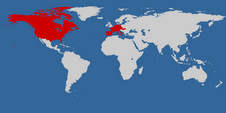
«Finland's turn at the EU presidency has thrust it into the spotlight – and exposed an uncommon passion – a penchant for Latin.
It is the only country in the world which broadcasts the news in Latin.
On its EU presidency website descriptions of meetings can be read in Latin. And its love of the language of Rome goes deep.
There is a man in the corner of the hotel lounge singing Elvis Presley's songs in Latin, like "Can't Help Falling in Love", or Non adamare non possum.
Or yet…
"Surrender": Nunc æternitatis
"It's Now or Never": Nunc hic aut numquam
"Wooden Heart": Cor ligneum
"Love Me Tender": Tenere me ama
It sounds a little like Italian but rather more stilted – like Italian sung by a foreigner with no ear for Dante's language.
The singer is Dr. Jukka Ammondt. "The legend of Elvis Presley lives for ever, and it's of course very important to sing Elvis Presley's songs in Latin, because it is the eternal language," he says.
Mia Lahti, who edits the EU presidency website, is like many Finns an optimist at heart. But why do a website in Latin?
"The website is in English and French," she says.
But they have their secret language: Conspectus rerum Latinus, or "Latin News in Brief".
"I know there are people who are angry because, for example, in their childhood they had to read compulsory Latin. But also I think it might be interesting to read the news in brief in Latin," Ms Lahti believes.
Lurking within the world of EU Latin, which is only marginally more difficult to comprehend than EU English, is one delightful statistic – more people subscribe to the newsletter in Latin than to the one in French… The Finns are clearly having their revenge on French President Jacques Chirac, who once dismissed their food as the worst in the EU.
The news in Latin on national radio gets 75,000 listeners. "In Latin we have more listeners in the world than for Finnish broadcasts," explains Professor Tuomo Pekannen, who does the translations. "Latin is more known abroad than Finnish," he adds.»
 Just have a glance at some Finnish words, phrases, and sentences, and decide for yourself what seems to be more difficult - Latin or Finnish.
Just have a glance at some Finnish words, phrases, and sentences, and decide for yourself what seems to be more difficult - Latin or Finnish.
Mitä kuuluu? – How are you?
Puhutteko englantia? – Do you speak English?
En puhu suomea. – I don't speak Finnish.
Nimeni on RIC, olen portugalilainen ja kotoisin Lissabonista. – My name's RIC, I'm Portuguese, and I'm from Lisbon.
Asun Belémissa, Länsi-Lissabonissa, Tajon joenrannassa (Estorilin ja Cascaisin lähellä). – I live at Belém, in western Lisbon, on the river Tagus's bank (close by Estoril and Cascais).
Just a small grammatical detail: we've always complained about those six dreadful Latin cases (nominative, genitive, accusative, etc.); but if you're thinking about learning some Finnish (a wonderful experience, I assure you!) prepare yourself to deal with those six and… ten more! Yes, the Finnish language has sixteen (16!) cases! A true adventure both for your mind and for your memory…
Now, do you still think learning Latin is an ordeal?...





















10 comentários:
Finnish has a relationship to the Basque language -- or so I have been told. And both are seemingly unrelated to the rest of Europe. Is this your take on it?
What a long day. Will try to take a couple of hours of leave tomorrow and Friday to try and come back to earth.
The following is from an email I sent to a friend tonight: Will send this to you as you are a friend now.
Each night I continue to clean out the kitchen. I keep running into all my mothers things and break down crying for about 1/2 to one hour now every night. Last night I found a recipe box with all her hand written recipe's. That just devastated me.
The “She is gone and never coming back" thing hits me each time. I mean -- I know this fact, so it should not logically be replayed as if it is new information but --
well, logic does not apply when you are mourning.
My mind turns to those who survived the holocaust. It is beyond my imagination or experience to relate to such an experience -- ANY part or role on that tragedy.
I see the look of "just keep smiling" in Jewish eyes -- especially ones of
that generation. Eyes elevated to the highest pinnacle of humanity in
valuing a single human life. I look back to my childhood and remember the
people who I now know were Jewish -- that had that smile. A courage based
smile of survival with all the baggage of utter pain and tragedy and
suffering and tears hidden in the smile.
That is why I like Jewish (Mahler) and Russian (Shostakovich) music as this quality -- this emotional and spiritual duality of seemingly incompatible opposites exist inside the music. Smiling with a broken heart. I can relate to that -- BIG time. I am a "Smiley" myself. I smile a lot. In my baby book it says I smiled on day two and the nurses flocked to see me as they had never seen a new born smile. I still smile a
lot -- and yet have a heart that is broken to smithereens by this world in
the midst of all that smiling.
Well...enough of this. Need to take a bath, have dinner, and empty more
kitchen cupboards....The contractor is pressuring me. I had promised top be completed last night and yet I am only half completed.
Tomorrow I am start two 1000 mile journeys with two single steps....More on that at some future date.
Me
Oi, Ric!
Estou passando aqui pra dar um ´alô`.
Eu sei que não tenho passado muito por aqui, mas como eu disse lá no meu blog, eu tenho tido uns probleminhas técnicos.
Bom, um abração!
Hello, Will! Finnish, Estonian, and Hungarian belong to the Finno-Ugric language family. Basque may be related to Georgian, in the Caucasus, but there's no evidence of that yet.
As I go on watching what's happening in this world, this may not be the best moment for me to be reminded of the Jewish tragedy. Many other peoples are right now living, suffering, and going through much worse ordeals than any Israeli can ever claim for himself these days. With no concentration camps. With no dictatorships ruling the world. Let's just not lose perspective...
(Those arrangements are becoming an ordeal to you as well... Hope you'll be done with that as soon as possible.) :-)
Olá Carioca! Espero que esses «probleminhas» sejam resolvidos rapidamente.
Felicidades!
Um abração para ti também! :-)
I once studied Biblicalk Greek - taught in English - with a woman who spoke fluent English but whose native language was Finnish.
She still thought in Finnish, which meant she had to translate the English lessons about Greek grammar into Finnish, and find a way to understand the Greek grammar in Finnish terms. And then translate the Greek into Finnish, then that into English.
She was also learning Hebrew at the same time.
---
I never found cases difficult to deal with, whether 6 or 16, becuase they serve the same function as prepositions and postpositions - I just treat them as postpositions glued onto the ends of other words.
But I could never get the hang of conjugations and declensions - the way different groups of words have different "postpositions" indicating the same meaning.
Latin declensions seemed strange, because the first has one "gender" that has little two do with real gender, the second has two, the fourth has three, and the third has a different system altogether. And there's only about three common words in the fifth.
And what is the vocative case of Ego, anyway?
That should be quite an adventure both for her and for you, Captain!
As a matter of fact - and as far as I still remember - only 12 cases are truly «active», and they're really postpositions; the problem is they all obey, as in Hungarian, to vocal harmony, which means, you always have to choose an ending among 32... Moreover, inner cases aren't regular at all...
The «difficulties» you mention are evidence that natural languages aren't logical at all; they're systems that change with time. Thus the strangeness of Latin declensions, of gender category (one of the nost difficult ones to grasp), and the irrelevance of «me calling myself». You cannot «call yourself» in English unless you use your name, and that's always either rhetorical or emphatical...
So much for logics... Of any kind whatsoever, Aristotelean, dialectical, fluid, you name it...
Eu sempre quis aprender latim, era o meu sonho, mas o facto é que não sendo um génio, não tenho tempo para tudo, do que me fico pela faculdade e uns quantos hobbies (sou péssimo em todos).
ric, a sério, tenho a maior admiração por ti, são tantas as línguas que falas, que fico completamente extasiado. Quem sou eu para opinar a respeito, mas acho verdadeiramente fantástico. Parabéns.
Não há razão para tal, André... Talvez possa dizer que ao longo dos anos fui podendo conciliar crescimento profissional com gostos pessoais. É tudo. Como sou muito curioso e teimoso, acabo por agarrar com ambas as mãos aquilo de que gosto. Mas... não há bela sem senão... outras coisas ficaram para trás, de que também gostava. E outras há ainda, em que sou uma nódoa. Nada há nisto de extraordinário, acredita!
Um abraço amigo!
i have the finnish flag in my bedroom
A former Finnish love?... I've heard they're few in Finland, but they're absolutely fantastic... I've tasted it, once only, unfortunately. I do know...
Enviar um comentário